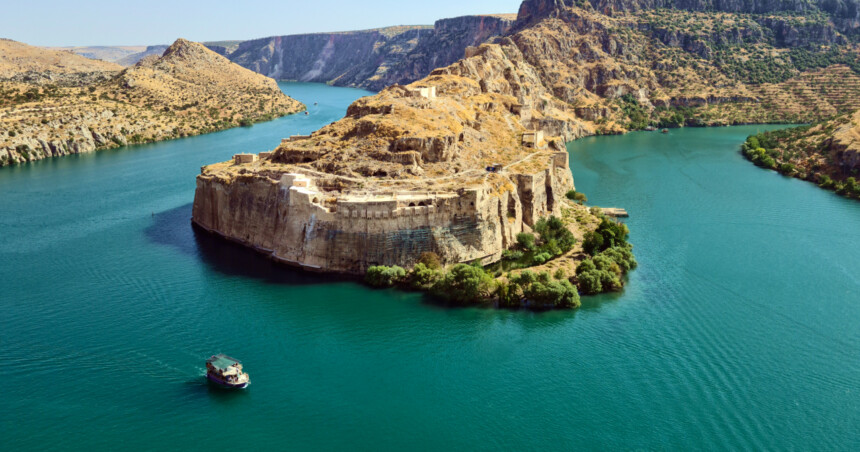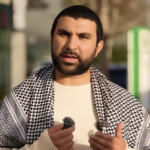The Euphrates has been one of the most important rivers throughout human history. Along with the Tigris, it makes up the cradle of civilisation, known as the Fertile Crescent. The river was critical to the development of some of the world’s first agricultural societies like the Sumerians and the Mesopotamians.
This magnificent river is, as authentically reported from the Prophet ﷺ in multiple narrations, one of the rivers of Paradise.
During al-’Isrā’ wal-Miʿrāj (the Night Journey and Ascension), the Prophet ﷺ was raised, eventually reaching the Lote Tree of the Utmost Boundary (Sidrat al-Muntahā, a majestic tree located in the seventh Heaven, at the end of the celestial realms where creation stops, and beyond which no creature — not even Jibrīl — is allowed to pass).
Once the Prophet ﷺ reached the boundary, he saw four rivers at its base — two visible and two hidden.
He (ﷺ) said,
أما الظاهران فالنيل والفرات
As for the visible ones, they are the Nile and the Euphrates.” [1a] [1b]
What is interesting is that the Euphrates was even mentioned in the Bible as one of the four rivers that served the Garden of Eden.
State of the river in the current day
Today, the Euphrates serves as a natural dividing line between what was historically known as the land of al-Shām (Greater Syria) and the area referred to as Upper Mesopotamia (al-Jazīrah al-Furātiyyah).
al-Shām covered a region that includes modern Syria, Lebanon, Jordan, Palestine, and parts of southern Türkiye. Its historical borders stretched from the town of al-ʿArīsh near the border of Egypt and Gaza in the south, across the Levant, all the way east to the Euphrates, and northward up to the Taurus Mountains in present-day southern Türkiye.
This blessed land of al-Shām is mentioned frequently in the hadīth literature, and as for this river — the Euphrates — our connection to it as an Ummah is both geographical and eschatological. There’s a significant link between this river and the major trials of the End Times.
Prophecy of the uncovered gold
The Prophet ﷺ said,
يوشك الفرات أن يحسر عن كنز من ذهب أو جبل من ذهب، فمن حضره فلا يأخذ منه شيئاً
Soon the Euphrates will uncover a treasure of gold — or a mountain of gold — and whoever is present there should not take anything from it.” [2]
In another narration found in Sahīh Muslim, it mentions:
يقتتل الناس عليه، فيقتل من كل مائة، تسعة وتسعون، ويقول كل رجل منهم: لعلي أكون أنا الذي أنجو
People will slaughter each other over it — ninety-nine out of every hundred will die — yet each man will say, ‘Maybe I will be the one who survives.'” [3]
A trial like no other. It reveals just how deeply human beings can be consumed by greed and how poorly they can assess danger when blinded by money.
This test will undoubtedly unfold, and it stands as one of the clear and undeniable signs of the Prophet’s truthfulness (ﷺ). When it does occur, it will deepen the conviction of the believers and may even awaken faith in those who once doubted.
Where exactly will this treasure be revealed?
The Euphrates flows through three countries: it originates in Türkiye, flows through Syria, and then enters Iraq, eventually combining with the Tigris, before pouring out into the Persian Gulf. However, the Prophet ﷺ did not specify the exact location along the river where this treasure will be revealed.
Will it be in the northern regions? The central regions? Or the south? Some reports, though doubtful in their chains of transmission, suggest that it will occur in the land of al-Shām. But none of these narrations are strong enough to be relied upon definitively. So the truth is: we simply don’t know where this event will take place.
Still, if we carefully examine reality and the broader context of the hadīth, we might be able to draw some likely conclusions, even if only speculative. For example, the nature of the massacre described in the hadīth suggests that it won’t occur in a place where there is a strong central authority — whether political, military, or security-based. This is no minor skirmish. It’s not the kind of fight where five or ten people are killed, like what might happen even in areas under stable governments. That alone suggests — and Allah knows best — the absence of a strong government at the time and place of this incident. The scale and chaos of the fighting implies there will be no one with the power to prevent it.
There is also another interesting point here. There is a hadīth, authenticated by some scholars like Ibn Kathīr and al-Bazzar, where the Prophet ﷺ said:
يَقْتَتِلُ عِنْدَ كَنْزِكُمْ ثَلَاثَةٌ ، كُلُّهُمْ ابْنُ خَلِيفَةٍ
Three men, all sons of caliphs, will fight over your treasure…” [4]
Some scholars understood this “treasure” to be in reference to the gold that the Euphrates will reveal. If that’s the case, then this narration adds a new layer of context. The fact that all three contenders over it are described as “sons of caliphs” potentially suggests these are not ordinary individuals, but rather powerful leaders or factions — each with their own military backing or loyalist battalions. So the fight isn’t just personal, it’s political and possibly part of a broader power struggle.
If we accept this interpretation — that the three contenders are fighting over the treasure of the Euphrates — we arrive at another important implication: the timing of the event.
When does it occur?
The Prophet ﷺ didn’t specify the exact time.
He (ﷺ) simply said,
لا تقوم الساعة حتى يُحسر الفرات عن جبل من ذهب أو كنز من ذهب
The Hour will not come until the Euphrates uncovers a mountain of gold or a treasure of gold.” [5]
In another narration, he (ﷺ) said,
يُوشِكُ الفراتُ أن يُحسَرَ عن كنزٍ من ذهبٍ
The Euphrates is soon to uncover a treasure of gold…” [5]
The word yūshiku (soon) implies nearness, but does not fix an exact date. So where do we situate this happening in light of the other End Times signs? If we go back to the narration regarding “three sons of caliphs” fighting over the treasure, it goes on to mention the appearance of the Black Flags from the east straight after it, the emergence of the Mahdi (the guided one), and the encouragement to pledge allegiance to him. So that would mean the uncovering of the treasure is either immediately before or directly tied to the arrival of the Mahdi — and since the Mahdi is one of the minor signs of the Hour, it would mean this event occurs before the descent of ʿĪsā (‘alayhi al-Salām) and before the major signs begin to unfold.
To reinforce this view, we also have a statement attributed to ‘Alī ibn Abī Tālib (radiy Allahu ‘anhu), which, though doubtful in its authenticity, provides key insight.
In it, he reportedly describes four types of tribulations:
فذكر معدن الذهب ، ثم يخرج رجل من عترة النبي صلى الله عليه وسلم ، يصلح الله على يديه أمرهم
…he referred to the appearance of the gold mine. After that, a man from the Prophet’s lineage will emerge (ﷺ), and Allah will set their affairs right through him.” [6]
This suggests, in sequence, that the emergence of the Mahdi comes after the gold appears.
Taken together, this is perhaps the strongest set of indicators we have to approximate when and where this event might unfold. From this, two key takeaways emerge. The first concerns the location: as mentioned earlier, we have no definitive report identifying the exact place. However, the most plausible scenario — and Allah knows best — is that it will occur in a region experiencing a vacuum of central authority.
The second relates to the geographic setting: it is unlikely to be too close to the source of the Euphrates in Türkiye, where the river is deep and its flow powerful. Instead, this points more plausibly toward the lands of al-Shām or central Iraq. This view is loosely supported by traditional narrations attributed to figures like Kaʿb al-Ahbār, though the chains of transmission are uncertain. These narrations suggest the event may take place in or near the region of al-Shām.
And there are other significant details about the Euphrates that are worth noting. For example, in an interesting and lesser-known narration, our mother ʿĀ’ishah (radiy Allahu ‘anha) is reported to have said:
من أصابه بُسْرَةٌ أو سم أو سحر، فليأت الفرات، فليستقبل الجرية فيغمس فيه سبع مرات
Whoever is afflicted by haemorrhoids, poison, or sorcery, let him go to the Euphrates, face the direction of its current, and immerse himself in it seven times.” [7]
This may be connected to the fact that the Euphrates is from the rivers of Paradise, or it could be that she heard this from the Prophet ﷺ.
However, we are beginning to witness early signs of the above. The Euphrates has been shrinking in several regions, its waters slipping to dangerously low levels. Several forces have ganged up against it: the dams built in the 1980s and 90s in Türkiye for irrigation and power, which choked the flow downstream; the tightening grip of climate change; and years of dwindling rainfall.
In the dried-out beds of the river, almost 80 archaeological sites have surfaced, including prisons and cemeteries belonging to the ancient city of Telbas, dating back to before the time of ʿĪsā (‘alayhi al-Salām). Some experts even warn that the river could disappear altogether by 2040. It may well be an early tremor of the event mentioned in the hadīth. And Allah knows best. [8]
Greed is such a dangerous thing
Among the profound lessons we draw from this hadīth is a powerful reminder about the nature of the human being.
We were created with some truly remarkable — and at times alarming — inclinations, one of the most potent being our deep-seated love for wealth. It’s part of our very makeup.
The Prophet ﷺ informed us that this particular trial will be so severe that 99/100 who approach it will be killed — and yet, each one of them will still convince himself that he might be the sole survivor!
ويقولُ كُلُّ رَجُلٍ منهمْ: لَعَلِّي أكُونُ أنا الذي أنْجُو
Each one of them will say: ‘Perhaps I will be the one who survives.’” [3]
The human being’s relationship with wealth is truly astonishing, and it reveals how easily our instincts can override both reason and revelation.
For this reason, the Prophet ﷺ couldn’t be clearer:
فمن حضره فلا يأخُذْ منه شيئًا
…so whoever is present at that time should not take anything from it.” [9]
When faith weakens, a person may barter away parts of his religion for material gain. Some do it blatantly and without shame, choosing wealth over honesty, money over salah, and so on. Others veil it with layers of excuses, clever justifications, and comforting rationalisation. But beneath all those arguments sits the same driving force: greed.
Time and again, history has shown us how wealth becomes the spark that ignites wars. But it’s not just nations, it’s families too. We see siblings who stop speaking for years, households torn apart over inheritance, lifelong friendships shattered over failed business deals.
Even worse is when this attachment reaches those entrusted with Islamic influence, particularly those with Islamic titles, who gradually dilute their message, softening their da’wah to unbearable degrees, choosing appeasement and the “safe” topics, all to protect a lifestyle funded by sponsorships, brands, or appearances. Without realising, they go from being callers to Allah to salespeople for products, cheapening the name of Islam in the process, whilst others remain silent when truth demands to be spoken, out of fear that honesty might cost them followers, invitations, income, or lifestyle.
And it’s not a new problem.
Allah tells us:
وَإِنَّهُ لِحُبِّ ٱلْخَيْرِ لَشَدِيدٌ
And indeed, he is intense in love of wealth.” [10]
And He (subḥānahu wa ta’āla) says,
وَتُحِبُّونَ ٱلْمَالَ حُبًّا جَمًّا
And you love wealth with immense love.” [11]
It’s a lifelong jihād — to rise above this powerful gravitational pull of stinginess, hoarding, and greed that is hardwired within us. That’s what makes the prophecy regarding the Euphrates: people will flock to it in full knowledge of the bloodshed to come, but inspired by the hope of being the one to make it out alive. That is the blinding pull of wealth.
Source: Islam21c
Notes
[1a] al-Bukhārī, 3,887; https://sunnah.com/bukhari:3887
[1b] Muslim, 164a; https://sunnah.com/muslim:164a
[2] al-Bukhārī, 7,119; https://sunnah.com/bukhari:7119
[3] Muslim, 2,894a; https://sunnah.com/muslim:2894a
[4] Ibn Mājah, 4,084; https://sunnah.com/ibnmajah:4084
[5] al-Bukhārī and Muslim; https://sunnah.com/riyadussalihin:1822
[6] Abu Nu’aym
[7] Musannaf Ibn Abu Shaybah
[8] https://features.csis.org/the-future-of-the-Euphrates-River/
[9] al-Bukhārī, 7,119; https://sunnah.com/bukhari:7119
[10] al-Qur’ān, 100:8
[11] al-Qur’ān, 89:20







